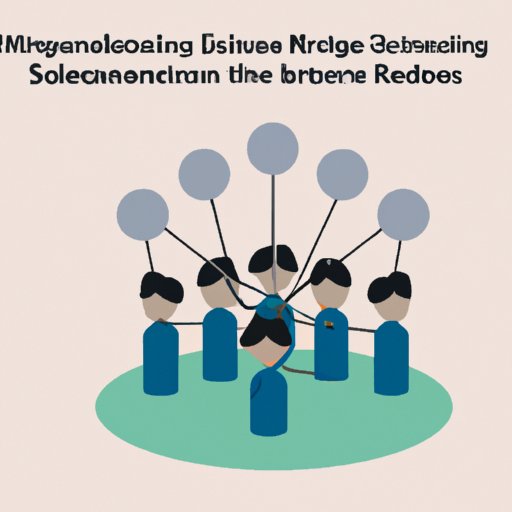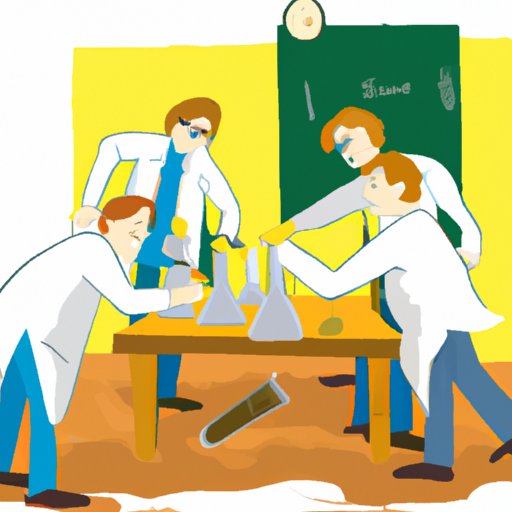Introduction
Experimental groups in science are a key component of research and have become an essential tool for understanding complex phenomena. But what exactly is an experimental group? In scientific research, an experimental group is a set of individuals or objects that are selected to be studied under specific conditions in order to test a hypothesis or answer a research question. This article will explore the world of experimental groups in science, examining the purpose, benefits, and applications of this important concept.
Exploring the World of Experimental Groups in Science
Before delving into the specifics of experimental groups, it is important to understand the basics of scientific experiments. An experiment is an organized procedure used to test a hypothesis or investigate a phenomenon. Experiments are designed to provide evidence that can be used to support or refute a given hypothesis or theory. The goal of any experiment is to identify cause-and-effect relationships between variables.
In any experiment, there are two main components: the control group and the experimental group. The control group is the group of individuals or objects that are not exposed to the variable that is being tested. This group serves as a baseline for comparison and helps scientists to determine if the variable being tested actually has an effect. The experimental group, on the other hand, is the group of individuals or objects that are exposed to the variable being tested. This group is used to measure the effects of the variable and to determine whether the hypothesis is supported or refuted.
Experiments and the Role of Experimental Groups in Scientific Research
Experiments are typically conducted with the aim of discovering new information or testing a proposed theory. In order to do this, scientists must identify the variables they want to study, determine the best way to measure them, and then use an experimental group to measure how those variables interact. To achieve this, scientists must carefully construct an experimental group that accurately reflects the population they are studying.
When creating an experimental group, scientists must consider several factors. First, they must ensure that the group is large enough to produce meaningful results. Second, they must ensure that the group is composed of individuals or objects that are representative of the population being studied. Finally, they must ensure that the group is randomly assigned so that all members of the group have an equal chance of being exposed to the variable being tested.
Once an experimental group has been created, scientists can begin to measure the effects of the variable being tested. This is done by comparing the results of the experimental group to the results of the control group. By doing this, scientists can determine if the variable being tested had a significant effect on the outcome of the experiment.
Applying Experimental Groups in Scientific Studies
Experimental groups can be used in a variety of scientific studies, including medical research, psychology studies, and environmental studies. For example, an experiment could be conducted to determine the effectiveness of a new drug by comparing the results of a control group to the results of an experimental group. In this case, the control group would receive a placebo while the experimental group would receive the new drug. By comparing the results of the two groups, scientists would be able to determine if the new drug was effective.
When conducting experiments with an experimental group, it is important to control for variables that may affect the results of the experiment. This means that all other variables should be held constant except for the one being tested. For example, if a scientist wanted to test the effectiveness of a new drug, they would need to make sure that the control group and the experimental group were similar in terms of age, gender, health status, etc. This ensures that any differences between the two groups can be attributed solely to the variable being tested.
Once the experiment has been conducted, scientists must analyze the data from the experimental group to draw meaningful conclusions. This involves looking at the results of the control group and the experimental group and determining if there are any statistically significant differences between the two groups. If there are, then the scientist can conclude that the variable being tested had an effect on the outcome of the experiment.

The Benefits of Using Experimental Groups in Scientific Investigations
Using experimental groups in scientific investigations can provide numerous benefits. For one, it allows scientists to achieve greater accuracy and precision in their results. By using an experimental group, researchers can more confidently attribute any changes in the outcome of the experiment to the variable being tested, rather than other factors. Additionally, using an experimental group also allows scientists to draw more meaningful conclusions from their results, as the differences between the control group and the experimental group can be clearly attributed to the variable being tested.
Finally, using an experimental group also provides scientists with a better understanding of the data they are collecting. By comparing the results of the control group and the experimental group, scientists can more easily identify trends and patterns in the data. This can help them form more accurate hypotheses and draw more meaningful conclusions from their experiments.

A Guide to Understanding Experimental Groups in Science
Experimental groups are a powerful tool for scientific investigations, but they can be difficult to set up and interpret correctly. To ensure that your experiments are successful, there are a few key steps to follow when setting up an experimental group. First, you must define the population you are studying and select a representative sample for your experimental group. Next, you must carefully control all variables except the one being tested. Finally, you must analyze the data from the experimental group to determine if the variable being tested had an effect on the outcome of the experiment.
Interpreting data from an experimental group can also be challenging. To ensure that you are drawing meaningful conclusions from your data, it is important to pay close attention to any trends or patterns that emerge. Additionally, it is important to remember that any differences between the control group and the experimental group must be statistically significant in order to be considered meaningful. Finally, it is important to take into account any confounding factors that may have influenced the results of the experiment.

Uncovering the Wonders of Experimental Groups in Science
Experimental groups have been used in a wide range of scientific studies, from medicine to psychology to environmental science. Some of the most successful experiments conducted with an experimental group include the discovery of the structure of DNA by James Watson and Francis Crick, the development of the polio vaccine by Jonas Salk, and the development of the atomic bomb by J. Robert Oppenheimer. These experiments demonstrate the power of experimental groups in scientific research.
Modern technology has also enhanced the use of experimental groups in science. Thanks to advances in computing and data analysis, scientists can now more easily create and analyze large experimental groups. This has allowed scientists to conduct experiments with greater accuracy and precision and to draw more meaningful conclusions from their data.
Finally, experimental groups have real-life applications in many areas of science. For example, in medicine, experimental groups are used to test the safety and efficacy of new drugs and treatments. In psychology, experimental groups are used to study human behavior and cognition. And in environmental science, experimental groups are used to study the effects of different pollutants on ecosystems.
Conclusion
Experimental groups are an essential part of scientific research and have helped scientists uncover some of the greatest mysteries of our time. They allow scientists to accurately measure the effects of variables, draw meaningful conclusions from their data, and develop new technologies and treatments. By understanding the purpose, benefits, and applications of experimental groups, scientists can unlock the wonders of science and further our knowledge of the world around us.
(Note: Is this article not meeting your expectations? Do you have knowledge or insights to share? Unlock new opportunities and expand your reach by joining our authors team. Click Registration to join us and share your expertise with our readers.)
